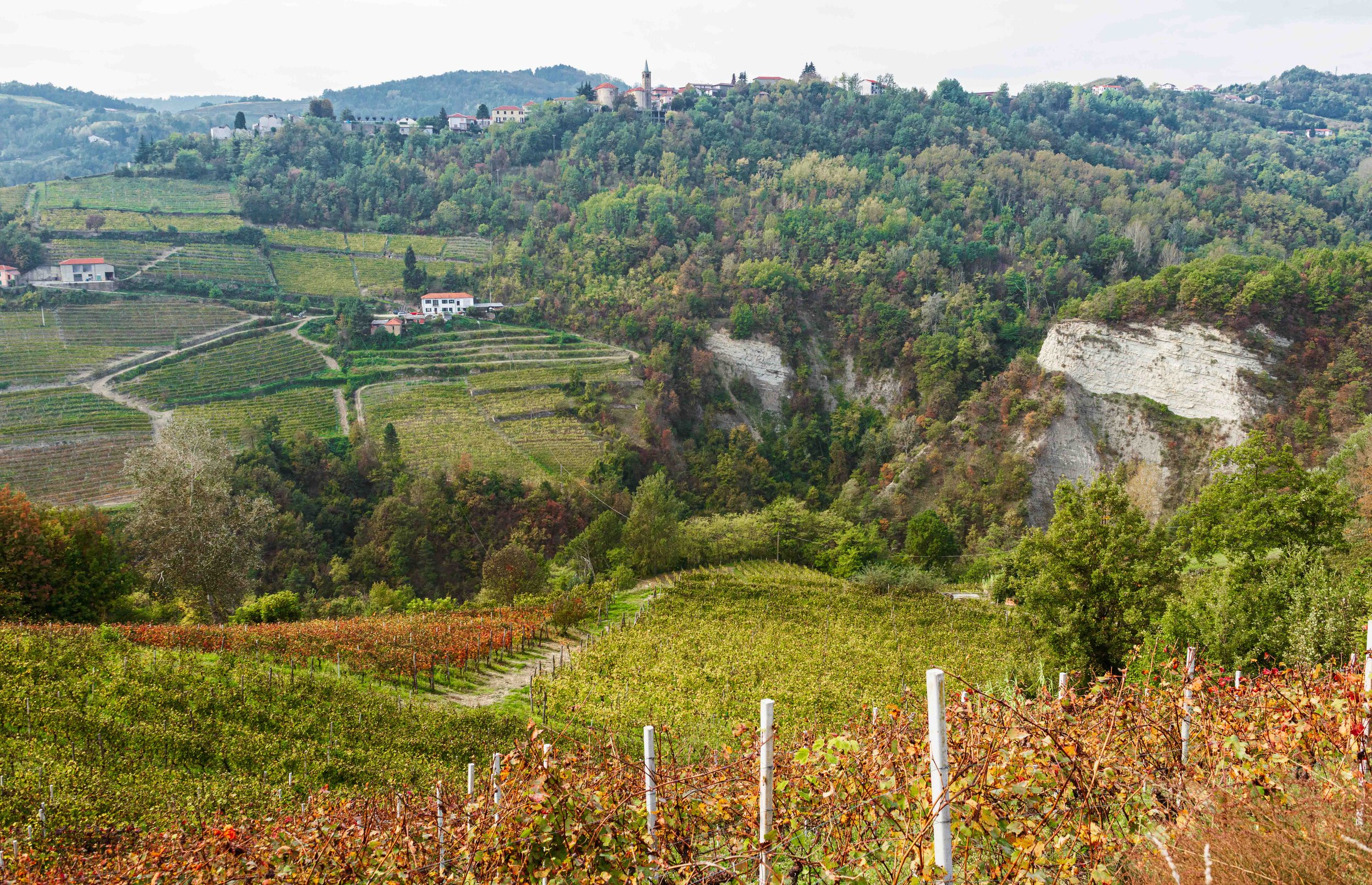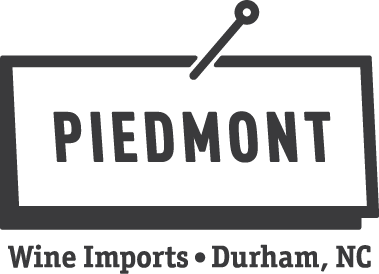




























































Borgo Moncalvo
Who: Andrea and Luca Elegir, and their parents
Where: Loazzolo, possibly the smallest DOC in Italy, south of Canelli (Piemonte, Italy)
What grapes: Moscato, Brachetto, Barbera, Dolcetto, Pinot Noir, Cortese
Key facts: Borgo Moncalvo power their estate entirely with solar panels, and use solar energy for their hot water. Many of their vines were planted in the 1920’s.
Website: www.borgomoncalvo.com
Instagram: @borgomoncalvo
Borgo Moncalvo “Valente” Metodo Classico Rosato Alta Langa DOCG
Viticulture: Organic
Soil type: Terra Bianca limestone-rich clay soils
Elevation: 300m - 450m
Grapes: Pinot Noir
Method of fermentation: 100% Pinot Noir, matured on the yeast for 60! months. The wine is made with only the natural grape sugars of the fruit, including the second fermentation. From high-elevation Guyot-trained old vines.
Made with Pinot Noir grapes that spend 30 months on the lees, with no added sugar at disgorgement, and of course, secondary fermentation in bottle. Comparisons will be made to Franciacorta, or brut rosé Champagne. To me the limestone comes through really vividly in this wine, giving it tart cherry fruit reminiscent of Smarties candy (the orange and pink ones.) Fresh, bracing, super-precise, and starting to pick up some secondary notes from evolution in bottle. Perfect pre-dinner/appetizer wine, or with fish. — JM
Borgo Moncalvo “Cento Scalini” Moscato d’Asti DOCG
Viticulture: Organic
Soil type: Limestone-rich soils
Elevation: 300m - 450m
Grapes: Moscato
Method of fermentation: The grapes are harvested after a careful selection and immediately pressed. After a short fermentation Canelli DOCG foam is ready and the wine can be bottled and consumed immediately.
“Cento Scalini” that is to say One Hundred Steps, identify the long stone stairs built by men over a hundred years ago to overcome the slopes of the ground which in some places reach 100% inclination.
Throw away your prejudices. This is great white wine. It’s certified organic, and made with exceptional, sweaty human effort. Cento Scalini is made from very old vines. Heroic agriculture, according to farmer Luca Elegir. The site is majestic. Wild, surrounded by pristine forest and a panorama of Alps. Unspoiled farmland like this is priceless. “In the alto Monferrato, the woods have the upper hand.” Luca mentions that vineyards in his home village climb to 600 meters above sea level. Steps are cut into the stone cliff faces, so that the Elegir family can ascend through their fields, and work the vines by hand. In semi-retirement, Luca’s father Pierluigi finds truffles in the forest bordering this vineyard. I know what you think Moscato is. This isn’t that. — JM
Borgo Moncalvo “Pierino ‘24” Dolcetto d’Asti DOC
Viticulture: Organic
Soil type: Limestone-rich soils
Elevation: 300m - 450m
Grapes: Dolcetto
Method of fermentation: In most vintages, spontaneous natural yeast fermentations in stainless steel.
Fruity and fresh like a cru Beaujolais, or a lighter Loire red. From high-elevation hillside vines planted in limestone-rich soils. Hand-harvested, macerated for a week before fermentation. The wine stays in cellar for 6-8 months before release.
“Pierino ‘24” celebrates the birth year of Luca and Andrea’s grandfather, the third generation of Elegirs currently inhabiting their farm. Semi-retired Pierluigi Elegir (their father) has taken me on extended hikes around their property, unearthing black truffles, discussing the Roman cisterns that provide water for their estate, pointing out extensive evidence of small deer that run rampant in their woods.
La Pajassa awes me with its classicism. Pierino 24 wows me with its fragrance. Pure red fruit, some bramble, like a walk to a picnic. You’d want to take along crusty bread, some paté, and a handful of ripe yellow plums. Maybe a fresh semi-firm cheese, like Toma Piemontese. — JM
Borgo Moncalvo “Elipsis” Moscato Secco Piemonte DOC
Viticulture: Organic
Soil type: Limestone-rich soils
Elevation: 300m - 450m
Grapes: Moscato
A teasingly small amount of this wine came to America last year. Now we have a smidge more, and can begin to share. Andrea Elegir makes precise, wildly aromatic, dry white wine from organically farmed grapes, using very low levels of sulfur. Pair this to fresh pastas and salads that are reliant on the abundance of beautiful basil currently in season.
Borgo Moncalvo Brachetto d’Acqui DOCG
Viticulture: Organic
Soil type: Terra Bianca limestone with clay
Elevation: 300m - 450m
Grapes: Brachetto
Method of fermentation: cold-stabilization to retain natural sweetness and delicate fizz
Frizzante, low alcohol, a lighter take on dessert wine. Also great as an apertivo. Guyot-trained hillside vines planted 300-450 meters above sea level.
This is one of a handful of overtly sweet wines that we import. It’s utterly delicious with dark chocolate and berries, a pairing that works with barely any other red wines. A little fizz adds lift to the ripe fruitiness. I am glad this comes in small bottles. Once opened I’m going to drink every last sip of it. Low abv wines definitely have their place in the universe.
Borgo Moncalvo “La Pajassa” Barbera d’Asti DOCG
Viticulture: Organic
Soil type: Mix of Calcerous marls and Clay Limestone
Elevation: 300m - 450m
Grapes: Barbera
Method of fermentation: Fermented at cool temperature, a long maceration period before racking. One year in oak before bottling.
Made from high elevation vines planted in the 1950’s. These vines are scrupulously thinned to lower yield and create a more intense wine. Hand-harvested, pressed immediately and fermented at cool temperatures. The wine has a long maceration period before racking, then at least a year in oak before bottling. The estate generally keeps its Barbera for several years prior to release.
It may be the best Barbera in our portfolio. Why is it so good? The Elegir family refer to their work as “heroic viticulture.” The vineyard is steep and remote, in a forested corner of the Alta Langa that feels a bit forgotten. Barbera grown on old vines, planted in 1950 by granddad. Rocky, calcareous terra bianca soil, organic farming, grapes hauled basket-by-basket out of a dizzying hillside with steps cut into the stone cliff face to make this labor even possible. Heroic.
Luca told me his family planted these vines in the 1950s. A tour of the hillside is a test of your calves, your cardiovascular fitness, and your footwear. Steep and stony, with staircases cut into the rock of the vineyards to make harvest possible. Wonderfully ripe, old school character spills out from this large-barrel aged Barbera. Wines rarely over-deliver this much. Don’t tell the Elegirs: they are crafting a classic mountain red, and selling it for a song. — JM
Visiting farms I am usually first greeted by dogs. Alex the basset hound met me in the long driveway, near an appealingly laden cherry tree. The cherries were a swirl of white/pale yellow and cherry red. I waited until they were offered… unsurprisingly they were more enjoyable than the kilo of cherries I had purchased roadside, fruit that basically sustained me for a week while meandering from farm to farm. Alex lives in Loazzolo, a tiny, steep valley in the southern Italian Piedmont. It’s a good dog’s life, plenty of space to amble among forest and vineyard, and time to greet the infrequent visitors who arrive down a precariously winding narrow road that clings to the valley’s sides.
After Alex’s welcome, Andrea Elegir emerged from the family home and cellar. Andrea is the young winemaker at Borgo Moncalvo, a 7-hectare organic property (5.5 ha of vines plus forest). He is also talented and motivated enough to make wine in the cellar of his closest neighbors. Andrea speaks French; he summoned by cell phone his brother (and Alex’s owner) Luca Elegir, who studies Spanish and English in Turin, and is unsurprisingly a Juventus fan. The dog is named after Alex Pirlo, the great Italian midfielder, recently an essential part of the championship-winning Juve side. Fine. I asked Luca why he wasn’t a Torino fan, mostly to be contrary. An entertaining torrent of derisive commentary concerning (mostly) the fans of Turin’s second (by a long margin) soccer team was unleashed. I like understanding people’s other passions.
We communicated mostly in Spanish while trekking the impressively steep vineyards around their home. It was a lively four-language discourse, an interesting moment in a shrunken-by-travel-and-technology world, a cloud of partially-learned nouns and poorly conjugated verbs trailing away in a tiny remote valley that Andrea claims is the smallest DOC in Italy. I believe him, but do not really know for sure.
How steep is steep? We talk about steep quite a bit. Here’s my metric. I slipped several times just trying to walk up the vineyard path, a dry rocky track that was probably only suited to hiking boots. I’m no mountain goat but similar balance difficulties have only afflicted me along the slate-strewn and dizzying Mosel.
The Elegir family is farming vines planted in the 1920s and the 1940s, the oldest parcels in the DOC, with the help of all family members and one hired worker. Their vines grow in a mix of terra bianca calcareous marls and terra rossa clay-limestone.
Borgo Moncalvo is small but ambitious. The cellar and estate run on solar power. The wines are certified organic. Borgo Moncalvo is sustainability at its best. A small farm maintained by generations of the same family, producing a high-quality regional product in a setting that allows space for the natural world to coexist.
And they seem to be having a good time doing it, too! As we tasted through many young and some old wines in the Elegir’s living room, Luca and Andrea’s mother introduced numerous plates of delicious food: a lemony chicken dish, local cheeses and salamis, cherries of course, and an excellent dessert of berries macerated in Brachetto. I should have eaten more, not to be rude, but there was so much to be had! My attention was distracted by a Cortese, leesy and ripe and note-perfect with the chicken, then by a subtle, refreshing Dolcetto and substantial Barbera. The fruity, fizzy wines were great, too. I left their hidden home in a fine mood. This encounter really felt like finding great wine made by the right people way down at the absolute end of the road.






